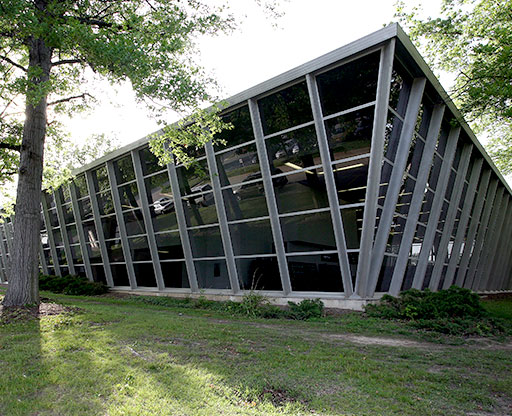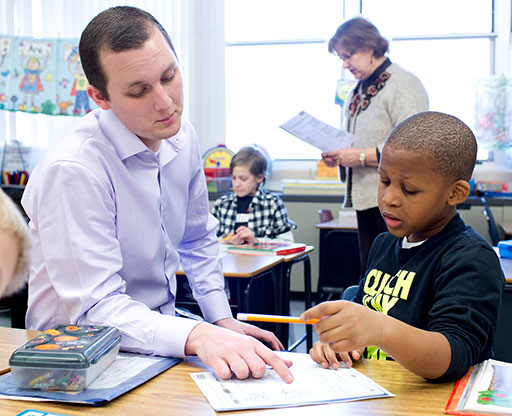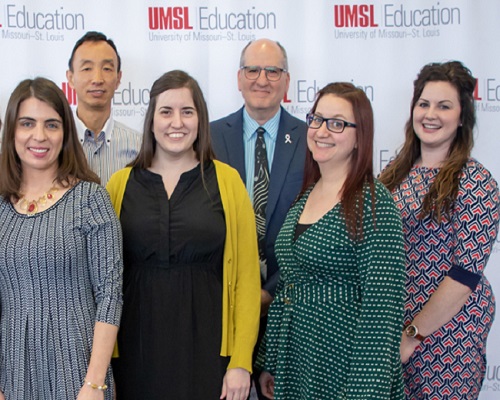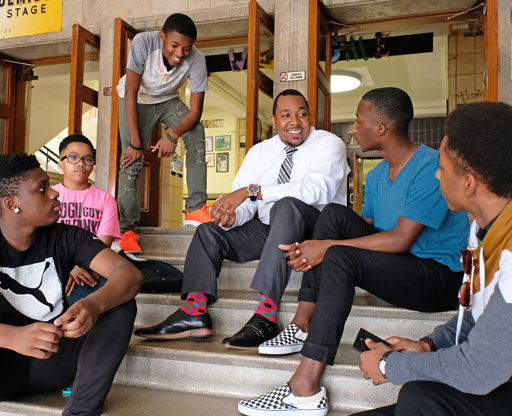Foster creativity and critical thinking skills.
High school chemistry teachers foster creativity, critical thinking skills and a love of science in students while facilitating learning and understanding of chemistry through guided inquiry, direct instruction, investigations, problem solving and discussion. Chemistry teachers must have mastery of chemistry content and a variety of strategies for facilitating student engagement and deep understanding of that information in order to support students in making connections between classroom learning and the world around them.
Program type:
Major, BSEd
Format:
On-Campus
Take the next step
Request more information below:
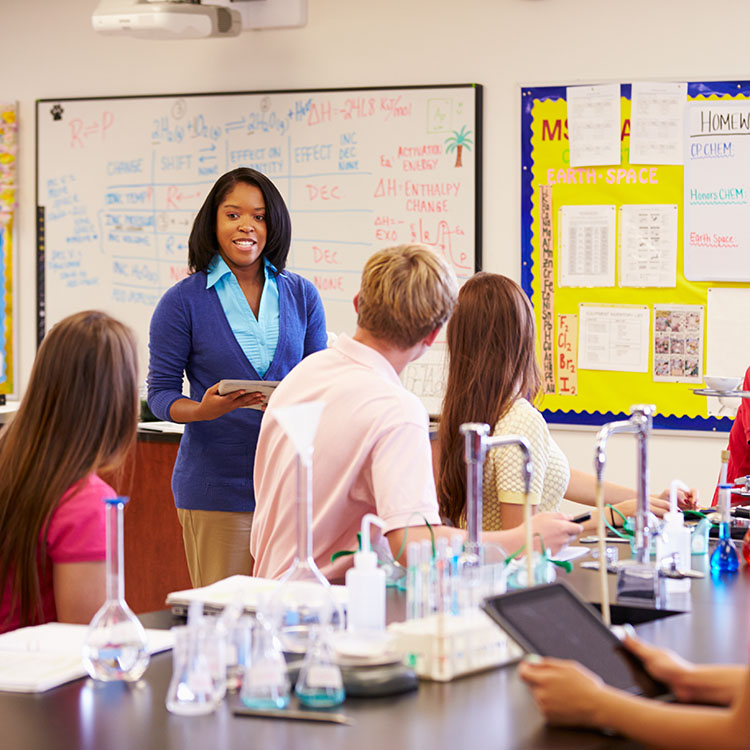
Bachelor of Science in Secondary Education -
Chemistry Emphasis
The BS in Secondary Education, with an emphasis in Chemistry, prepares students to teach in secondary school settings, grades 9-12. This program requires the selection and completion of required coursework in chemistry and includes field and practicum experiences in high school settings, culminating in Missouri teacher certification.
This program coordinates with the Department of Chemistry where you’ll be exposed to research and teaching laboratories and a wide variety of modern research instrumentation. Much of the discipline-specific coursework parallels the BA or BS degree in Chemistry; however, the Missouri Department of Elementary and Secondary Education (DESE) requires specific coursework for teacher certification.
Outcomes and Career Outlook
Upon completion of the program, graduates will be able to improve and enhance student learning; integrate technology to create meaningful student learning; create authentic and deep learning experiences; use learning science principles to design, implement and evaluate curriculum; foster effective working relationships; design and establish a safe and respectful learning environment; and use equitable frameworks to create a variety of instructional and assessment opportunities adapted to learners to encourage all students’ critical thinking, problem solving and performance skills.
Employment of high school teachers is projected to grow up to 1% to 2032, with a national median annual salary of $65,220, according to wage and employment data from the U.S. Bureau of Labor Statistics.
65,220
1
Career Opportunities
- Classroom Chemistry Teacher, High School
- Lab Worker
Plan of study
Core Areas
First Year Writing |
||
| ENGL 1100 | First-Year Writing (MOTR ENGL 200) | 3 |
Communication Proficiency |
||
| EDUC 2222 or COMM 1040 |
Interpretation: Connecting Audiences and Meaning Introduction to Public Speaking (MOTR COMM 110) |
3 |
Math Proficiency |
||
| MATH 1020 or MATH 1030 |
Contemporary Mathematics (MOTR MATH 120) College Algebra (MOTR MATH 130) |
3 |
Information Literacy |
||
| ED TECH 2230 | Information Literacy | 3 |
American History or Government |
||
| POL SCI 1100 or HIST 1001 |
Introduction to American Politics (MOTR POSC 101) American Civilization to 1865 (MOTR HIST 101) |
3 |
Humanities and Fine Arts |
||
| Choose any 9 hours from approved fields. | 9 | |
Social Science |
||
| Choose any 9 hours. At least one course must meet the cultural diversity requirement | 9 | |
Math and Life/Natural Sciences |
||
| Choose any 9 hours | 9 | |
Junior Level Writing |
||
| ENGL 3100 | Junior-Level Writing | 3 |
Total Hours |
45 |
|
Program Requirements
All students in the B.S.Ed. in Secondary Education program are required to take the following Teacher Education courses. Each student must also select a content area and complete the required courses and certification assessments for that area as specified by the Missouri Department of Elementary and Secondary Education.
Grade Requirement
Professional Education courses must be completed with a grade of C or better (courses completed with a grade of C- or below must be retaken).
GPA Requirement
Beginning with those students graduating in May 2017 who will also receive teaching certification, the Missouri Department of Elementary and Secondary Education requires a 3.0 GPA in professional education courses, a 3.0 GPA in the teaching content field, and a 2.75 overall GPA.
Assessment Requirement
Students must pass the required DESE certification assessments to receive the B.S.Ed. degree.
Preparing for the Teacher Education Program
The following courses must be completed prior to applying for admission to the teacher education program:
| TCH ED 1000 | Building Community, Culture, and Learning in Education | 1 |
| TCH ED 1001 | Early Clinical Experience: Community Agency | 1 |
| TCH ED 2000 | Becoming a Professional Educator | 1 |
| TCH ED 2001 | Early Clinical Experience: Schools | 1 |
| TCH ED 2209 | Foundations of Teaching in American Schools | 2 |
| TCH ED 2212 | Child and Adolescent Development | 3 |
Total Hours |
9 |
|
Teacher Education Program
The following courses are completed after acceptance into the teacher education program:
| TCH ED 3001 | Mid-Level Clinical Experience: Diverse Learners 1 | 1 |
| ED PSY 3312 | Psychology of Learning, Instruction, and Assessment | 3 |
| TCH ED 3310 | Introduction to Methods of Teaching | 3 |
| SPEC ED 3318 | Inclusive Classrooms | 3 |
| TCH ED 4391 | Literacy for Adolescent Learners in Content Areas | 3 |
| SEC ED 4880 | Writing for Teachers1 | 3 |
Total Hours |
16 |
|
1SEC ED 4880 is not required for foreign language emphasis areas.
In addition to the above courses, students must complete 30-50 hours of required coursework in one specific content area (English , French K-12, Spanish K-12, mathematics, biology, chemistry, physics, or social studies), as well as the appropriate methods course:
| SEC ED 4011 | The Curriculum and Methods of Teaching History and Social Studies | 3 |
| SEC ED 4240 | Curriculum and Methods of Teaching Physical Sciences | 3 |
| SEC ED 4589 | Curriculum and Methods of Teaching Foreign Languages | 3 |
| SEC ED 4646 | Curriculum and Methods of Teaching Foreign Languages | 3 |
| SEC ED 4885 | The Curriculum and Methods of Teaching English | 3 |
| SEC ED 4985 | Curriculum and Methods of Teaching Life Sciences | 3 |
The program will culminate in the following practicum courses:
| SEC ED 4989 | Practicum I: Site-Based Experience | 3 |
| SEC ED 4990 | Practicum II: Site-Based Experience | 12 |
Total Credit Hours: 120 Minimum
B.S. Ed. in Secondary Education with Emphasis in Chemistry
The B.S. Ed. is a professional education degree designed for students who wish to pursue a teaching career in secondary schools. Much of the discipline-specific coursework parallels the B.A. or B.S. degree in the discipline; however, the Missouri Department of Elementary and Secondary Education (DESE) requires specific coursework for teacher certification. Therefore, students interested in the B.S. Ed. should contact the advising office (OASIS) 314-516-5937 in the College of Education for discipline-specific requirements. Note: To obtain teaching certification, DESE requires a 3.0 GPA in the discipline and professional education coursework, as well as a 2.75 GPA overall.
B.A. or B.S. in Chemistry with Master’s Level Coursework for Secondary Teacher Certification
In addition to the B.S. Ed., students may opt to complete a B.A. or B.S. degree in their discipline as an undergraduate, followed by admission to the Graduate School for Master’s level teaching certification. The College of Education has a one-year accelerated program for post-graduate certification called Teach in 12, or students can choose a traditional path to certification. Graduate coursework for certification can apply towards a Master’s Degree in Secondary Education, with additional coursework. Students interested in Master’s Level teacher certification should contact the advising office (OASIS) 314-516-5937 in the College of Education. Note: To obtain teaching certification, DESE requires a 3.0 GPA in the discipline and professional education coursework, as well as a 2.75 GPA overall.
All majors must meet the general education requirements of the university in addition to completing degree-specific curriculum requirements.
Review Full Degree Requirements
Non-Missouri Residents: Prospective students are responsible for reviewing the UMSL state authorizations page to see if this program is offered in their state throughout their program and to review the licensure or certification requirements for the state in which they reside.
Student organizations
Make new friends and learn new skills by joining one of our Recognized Student Organizations. Here are several opportunities you may be interested in as a secondary education major:
- EduCATE: Collegiate Association of Teachers and Educators
- Kappa Delta Pi, Mu Iota Chapter
- Student Government Association
- Students of the University of Missouri
Internship opportunities
The College of Education hosts many centers and initiatives that enhance student experiences in our programs and work with more than 36 different public, private and charter schools throughout the region. We also sponsor eight charter schools.
Honors College
The UMSL Honors College is a certificate program that can be paired with any major without adding extra classes or extending time to graduate. Classes in the Honors College are seminar-style, meaning that they are based in reading, writing, discussion, and critical thinking. This unique class format fosters an intellectual climate centered around democracy, civility and academic excellence.
Undergraduate research
We encourage and support students as they engage in exciting activities in and outside of the classroom that enrich their academic and professional understanding of their chosen area of study. All majors are encouraged to participate in Undergraduate Research and Scholarship to produce discipline-specific intellectual or creative innovations to their field.

